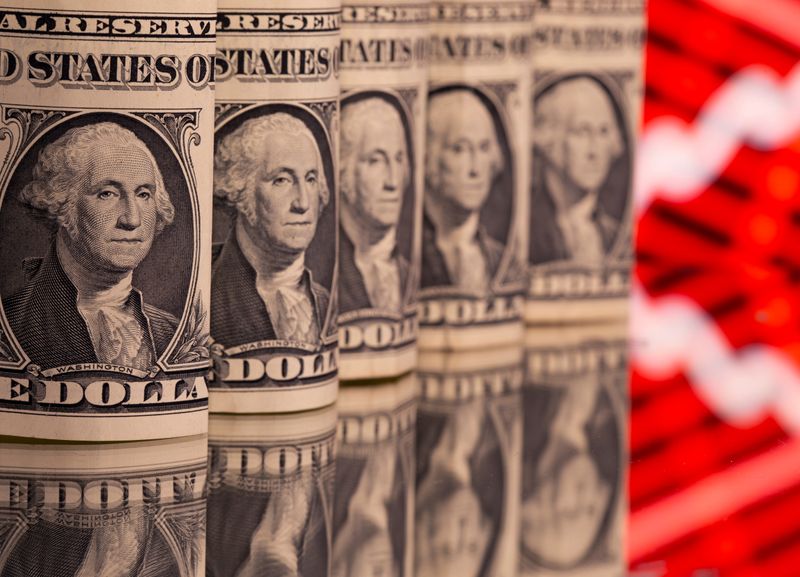By Ritvik Carvalho
LONDON (Reuters) - The U.S. dollar traded near its lowest in more than two weeks versus major peers on Thursday, tracking Treasury yields lower, after minutes of the Federal Reserve's March policy meeting offered no new catalysts to dictate market direction.
Fed officials remained cautious about the risks of the pandemic - even as the U.S. recovery gathered steam amid massive stimulus - and committed to pouring on monetary policy support until a rebound was more secure, the minutes showed Wednesday.
Fed Chair Jerome Powell will speak at a virtual International Monetary Fund conference later on Thursday.
The dollar index which measures the U.S. currency against a basket of six currencies, edged lower to 92.30 in London trading, after dipping as low as 92.134 on Wednesday for the first time since March 23.
The index rallied to an almost five-month high of 93.439 at the end of last month as the U.S. pandemic recovery outpaced that of most other developed nations, particularly in Europe.
"The Fed minutes delivered no negative surprise for risk sentiment, with the committee reiterating no need to rush into tightening of monetary conditions and further support the recovery," said Petr Krpata, chief EMEA FX and interest rates strategist at ING.
"We expect the very accommodative Fed to eventually weigh on USD as we move into the summer - rising inflation, yet no signs of imminent rate hikes will push front-end US real rates further into the deep negative, and coupled with the recovering global economy (which should be of a more synchronized nature in 2H21), should weigh on USD."
The benchmark 10-year Treasury yield was around 1.658% on Thursday, after dipping below 1.63% overnight. It hit 1.776% late last month, its highest in more than a year.
The S&P 500 eked out a modest gain on Wednesday, moving mainly sideways since surging to a record high to start the week.
The chief currency strategist at Citigroup (NYSE:C) Global Markets Japan, Osamu Takashima, said that the market's direction is difficult to call, but expects the next move for the dollar to be lower.
"Current market sentiment is mild risk-on, and under such circumstances the dollar will weaken gradually - but no big moves," he said.
The retreat in U.S. yields has also removed a driver for dollar gains, he added.
The dollar weakened to 109.49 yen , consolidating after retreating from 110.97, its highest in more than a year, reached on March 31.
The euro was almost unchanged from Wednesday at $1.1876, after rebounding from $1.1704, its lowest in almost five months, touched on March 31.
"The vaccination progress in the Eurozone is significantly lagging that of the U.S., and coronavirus infection rates in the Eurozone are on the rise again," Commonwealth Bank of Australia strategist Joseph Capurso wrote in a client note.

"As such, EUR/USD is vulnerable to a move lower towards 1.1700 in the near‑term."